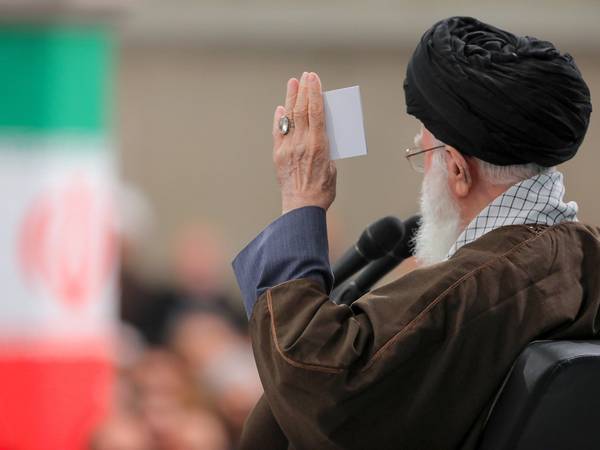Iran's Supreme Leader struck an unusually mild tone in a speech aimed at convincing those hesitant to participate in the March 1 elections that voting is crucial for the country's security.
“We should view the elections from the national interests’ perspective, not from factional perspectives. If the election [turnout] is weak, the loss will affect everyone,” Ali Khamenei told the youth voting for the first time and the families of martyrs Wednesday while stressing that he was not “accusing anyone”. Amid expectations of very low turnout, Khamenei appeared to be pleading with people to go to the polls on Friday.
Khamenei underscored the link between national power and security, cautioning that perceived weakness could embolden adversaries to threaten Iran's security. “If the enemy feels that you are not capable, [and] the Iranian nation has no power, they will threaten your security in every way,” he said. He urged individuals expressing reluctance to vote, and those dissuading others from doing so, to contemplate the implications, and “think some more.”.
“National security is all that matters. If there is no security, nothing else will remain. The enemy is opposed to our national power. Therefore, they oppose everything that is a manifestation of national power, including elections."
The extensive disqualification of candidates by the Khamenei-appointed Guardian Council, coupled with dire economic conditions and regime crackdowns on protesters, have led many ordinary Iranians to question the legitimacy of elections they perceive as orchestrated and unlikely to bring meaningful change.
Falling short of outrightly boycotting the elections like Iran's imprisoned Nobel Peace Laureate Narges Mohammadi and others, some political parties and groups such as the reformist Etehad-e Mellat (Nation’s Unity) party have refused to endorse any candidates in the simultaneously held elections of the parliament and the Assembly of Experts whose main purpose is choosing Khamenei’s successor.
Former President Hassan Rouhani, despite being disqualified from running in the Assembly of Experts elections, is urging voters to participate, framing it as a form of protest against the current circumstances and a call for reform to improve livelihoods, increase freedom, and enhance national prosperity.
Rouhani stressed the importance of voting for candidates who openly oppose the status quo and advocate for substantive change, acknowledging that the path to desired reforms may be long and challenging.
However, it is not clear which candidates the former president was referring to as almost all critical voices have been barred from competing as candidates.
While Rouhani criticized authorities for failing to foster conditions conducive to broad participation and fair competition, he also cautioned against neglecting the security and integrity of the electoral process.
In the past few days, state-affiliated media affiliated and the spokesman of the Guardian Council, Hadi Tahan-Nazif, have claimed that new polls conducted indicate interest in the elections and prospects for a higher turnout have increased. However, some former officials claim that turnout can be as low as 10 percent, while hardliners, who have already secured their victory claim that up to 70 percent may turn out to vote.
Regime-controlled media refer to polls taken by state agencies including a poll conducted by the state-run Iranian Students Polling Agency (ISPA) published Wednesday that predicted turnout at national level at 41 and in Tehran and its suburbs at 23.5 percent.
ISPA says 38.5 percent of the 5121 respondents to its recent poll conducted on February 26 and 27 said they would “definitely” take part in the elections against 32.6 percent who were determined not to vote, claiming that the percentage of those who have decided to vote has gone up by 11.1 percent from 27.9 percent in its earlier poll in late October.
